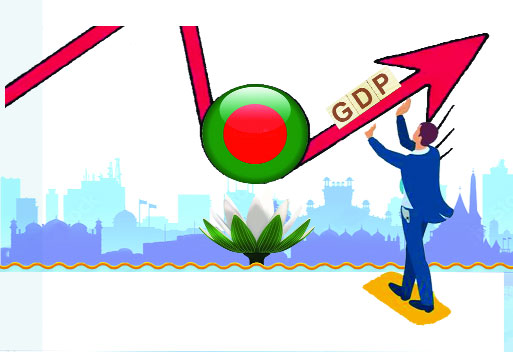Bangladesh’s economy under huge pressure
Mahfuja Mukul : The World Bank has predicted that Bangladesh’s gross domestic product (GDP) will be lower than the target in the current financial year 2023-24. Besides, the organization also thinks that the country’s economy will be under pressure in the short term. Economists of the World Bank have brought forward the decrease in purchasing power of consumers due to high inflation, shortage of energy products, increase in interest rates and poor financial management.
The World Bank presented the report titled ‘Bangladesh Development Update’ at a conference at its office in Agargaon, capital yesterday. The keynote was presented by World Bank Senior Economists Ranjit Ghosh and Bernard Haven. World Bank Country Director Abdullahi Sek was present on the occasion.
In the current fiscal year, the GDP target of Bangladesh government is 7.5 percent. But according to the World Bank’s forecast, the GDP growth in the current financial year may be 5.6 percent. The company had given the same impression last October.
Bangladesh Bank has taken the initiative of merger of weak banks with strong banks to reform the country’s banking sector. The World Bank advised to be more careful in implementing this initiative. According to them, banks should be consolidated based on asset quality and specific policies.
The World Bank says policies should be made so that banks have a transparent understanding of mergers. Policies should be made according to international standards. The company has warned that if the merger is done without taking proper initiative, the losses may be reversed.
The World Bank does not see much positive change in various macroeconomic indicators in the near future. The organization’s observation on inflation is that it may be more than 9 and a half percent in the next financial year.
According to the World Bank, inflationary pressure will continue due to the devaluation of the currency. Export growth may also slowdown in the current financial year due to the impact of import controls. The contribution of agriculture and industry sector to GDP may also decrease this year. However, the service sector is predicted to expand somewhat. The economy of Bangladesh will be under pressure in the short term and there is a danger that the deficit of financial accounts will become evident.
According to the World Bank, the growth will increase slightly to 5.7 percent in the next financial year 2024-25. Although last October it was said to be 5.8 by the company. According to them, the growth may further increase to 5.9 percent in FY 2025-26. But economic weakness may become more pronounced if appropriate reform measures are not taken. Besides, if the exchange rate is not reformed, reserves and imports will not be normal.
The World Bank believes that the prevailing inflation, balance of payment deficit and weakness of the financial sector are hindering the economic growth of Bangladesh. However, they have evaluated some steps as positive. These include price adjustment of energy products, reduction of export subsidies and tightening of monetary policy.
The World Bank’s advice on reforms is to reduce automation and reduce tariffs to raise revenue in LDC transition. Duty should be reduced on daily products.
Abdullahi Sek, Country Director of the World Bank, said, “Many families are suffering due to high inflation. Import controls may create supply shortages. Bank defaults are very high. The World Bank is ready to help bring about reforms in this sector. Proper guidelines should be carefully followed in case of bank mergers. Exchange rate should be market based. All in all, Bangladesh is facing several challenges. However, vigorous reforms of the financial sector can help ensure Bangladesh’s macroeconomic stability and achieve growth.
According to the report, regional growth in South Asia in 2023-24 could be 6 percent. In 2024-25 it will be 6.1 percent. India, Bangladesh will play a key role in this. Apart from this, the situation in Pakistan and Sri Lanka is also improving. Global growth is likely to be 2.4 percent in the current fiscal year, which is likely to be 2.7 percent in the next fiscal year. Global growth averaged 3.1 percent in the decade before the Covid pandemic.
The World Bank has predicted that India’s GDP will grow by 7.5 percent in the fiscal year 2023-24. In Pakistan it will be 1.2 percent. Besides, there will be 4.9 percent growth in Bhutan, 3.3 percent in Nepal, 2.2 percent in Sri Lanka and 4.7 percent in Maldives.
Rare Israeli airstrike in Beirut kills Hezbollah commander and more than a dozen others
International Desk: Israel launched a rare airstrike that killed a senior Hezbollah milita…








